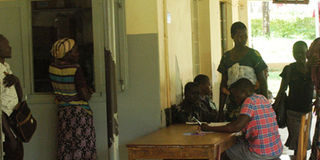10 years after Kony war, mental health challenges persist in Acholi

Patients receive medicine at Gulu hospital. The hospital handles some 1,000 mental health patients every month, of whom between 200 and 300 are fresh cases .
What you need to know:
Effects of 20-year war. A study conducted by Gulu University researchers in 2006, just as the guns were falling silent, found that 62 per cent of the people of Acholi sub-region had mental health problems, especially post-traumatic stress disorder. Government funding, however, did not increase in reaction to this need.
One fateful day in March this year, a mentally sick patient ran amok and, using the spear he found in the shrine, killed the traditional healer who was dealing with his condition. This happened in Pabbo Sub-county, Amuru District, northern Uganda.
The patient was later taken to Gulu Regional Referral Hospital where he received treatment and largely recovered his mental faculties. He was later embarrassed for his actions and apologised profusely. His family “compensated” the bereaved family with some cows under the Acholi traditional justice system, mato oput, and the matter was settled.
This story was related to us by Mr William Odur, a senior psychiatric officer at Gulu Regional Referral Hospital.
Mr Odur has for many years been at the centre of the upsurge in mental health problems in Acholi and northern Uganda in general, occasioned by the two-decade insurgency of Joseph Kony’s Lord’s Resistance Army.
In emphasising how war increases the chances of people developing mental health problems, R. D. Laing, a British psychiatrist, famously said insanity is “a perfectly rational adjustment to an insane world.”
In line with this thinking, a study conducted by Gulu University researchers in 2006, just as the guns were falling silent, found that 62 per cent of the people of Acholi sub-region had mental health problems, especially post-traumatic stress disorder.
A similar study by researchers at the Ministry of Health, permanent secretary Asuman Lukwago says, returned similar results. Going by these findings, a widespread and vigorous response was needed to address this problem.
Doing more with less
Government funding, however, did not increase in reaction to this need. A 2010 study found that the government of Uganda committed less than one per cent of its health budget to dealing with mental health problems, and that of this money 55 per cent was committed to the national mental health hospital at Butabika in Kampala.
Dr Lukwago acknowledges that the funding for mental health is low, but insists “the critical aspects of mental health are well funded”. Pointing at Gulu Regional Referral Hospital itself, Dr Lukwago says a new unit for mental healthcare has just been constructed, just as has happened at many other referral hospitals.
Whereas Dr Lukwago makes a strong argument for improving mental health institutions all over the country, his response in another way highlights how little the government has done to solve the northern Uganda mental health crisis.
An overwhelmingly high percentage of the drugs that treated mental health patients in northern Uganda over the past decade did not come from the government of Uganda budget, for instance.
Emergency situations
The donor community, as they are usually keen to do in emergency situations, for some years masked the deficiency in funding mental health, particularly in the emergency situation that is northern Uganda.
Non-governmental organisations, foreign governments and the World Health Organisation supplied drugs and trained personnel, in addition to helping initiatives like village health teams.
But 10 years later, the situation is no longer of an emergency nature. And the donors have pulled back. Most of the projects the donors were supporting at Gulu Regional Referral Hospital and other units and the drugs that were being supplied by the donors, ceased about three years ago.
This, however, does not mean that the emergency has been contained. Every month, Mr Odur says, Gulu hospital handles some 1,000 mental health patients, of whom between 200 and 300 are fresh cases. Mr Odur thinks his hospital handles “by far the highest number of cases in the country”.
The patients come from as far as Masindi and Kiryandongo in Bunyoro; Lira, Apac, Oyam in Lango; different districts of West Nile; and the whole of Acholi sub-region. Some others come from across the border in South Sudan, Mr Odur says.
The drugs sometimes run out since the donors no longer supply, Mr Odur says, in which case Gulu hospital asks the other districts apart from Gulu to surrender part of their drug allocations from the Ministry of Health.
At the referral hospital, the patients are treated by five clinical officers, one medical officer who is a psychiatrist, and the team from Gulu University medical school.
Traditional healers fill the gap
Gulu Regional Referral Hospital has an in-patient capacity of just 15 and 25 patients, meaning it will be crowded when there are more critically sick patients who need to be managed at the hospital.
Most of the other patients are treated and then return to their homes, where the care is not as good and, depending on how they are treated at home, they sometimes relapse into bad mental health.
Another matter that causes relapse of mental patients is hunger, Mr Odur says. He says because more people go hungry in many parts of northern Uganda during the months of May, June and July, the rates of relapse are highest during those months.
Beyond the psychiatric help, it then seems, enhancing the capacity of the post-war communities to feed themselves will help the war against mental illness.
But if sufficient food is important for one’s state of mental health, spiritual issues may even rank higher in the view of many people. Mr Odur says all the patients that end up at Gulu hospital will have seen a traditional healer first.
Joseph Labeja is now a mad person on the streets of Gulu town. On a day his brother, Amos Okello, does not remember in the mid-1990s, Labeja was abducted by the Lord’s Resistance Army rebels from Sir Samuel Baker Primary School in Gulu. He went on to become a rebel himself, and for years he participated in raids that resulted in killings, looting and abductions.
Tired of the fighting and fearful that he could be killed at some point, Labeja managed to escape from the rebel ranks after a number of botched attempts.
On returning home, his brother says, Labeja reported to the nearby army detach and later the 4th Division headquarters in Gulu.
Labeja was offered the option of being integrated into the Uganda People’s Defence Forces, Mr Okello says, but he turned it down because “he was tired of fighting and just wanted to live in peace”.
“Later he (Labeja) started feeling disturbed and told our mother to take him to Awere hill to pray,” Mr Okello says. Before Joseph Kony took to rebellion, it is reported that he was a traditional healer and used to spend hours up Awere hill in prayer.
Before launching the war, the story goes, Kony disappeared from his followers for three days and they only later discovered him at Awere hill praying.
On the day he was discovered on the hill, Matthew Green writes in Wizard of the Nile: The Hunt for Africa’s Most Wanted, “Clouds were marching through the sky but Kony told his brother not to be afraid, vowing to hold back the storm. He made good on his promise. His communion with the spirits now complete, Kony was ready.”
Such is the belief some people have in the healing elements of whatever is at Awere hill. Labeja had perhaps heard of the stories of Awere hill during his time with the rebels, or perhaps earlier before he went to the bush. But when he felt disturbed, Mr Okello says, he was convinced that his situation would not be remedied by anything or at any place apart from Awere hill.
“He appeared to get well every time he prayed at Awere hill,” Mr Okello said. But his brother’s condition deteriorated irretrievably after their mother died. Perhaps no one else offered him as much care as his mother did. Perhaps he just could not live with the absence of his mother.
Whatever the case, Labeja now lives on his own in the vagaries of Gulu Town and his brother and other relatives only encounter him by chance and offer him whatever they can.
Unknown quantity
Mr Odur spends his working hours trying to ensure that people stay sane. His heart sinks, he says, whenever he goes to Gulu Town.
“In Gulu you encounter many people, many of whom have only freshly run mad; many of them walking half-naked,” he says.
Mr Odur, like Dr Lukwago of the Ministry of Health, has no way of knowing exactly how many people in Gulu, northern Uganda and the entire country, need help as regards their mental health.
Both of them agree, however, that the number of such people is higher in northern Uganda than it is in most parts of the country, because the northern Uganda war is the freshest in memory and was sustained for much longer than any other war in the country.
At the height of the war, it was estimated that one in three of all the people in Acholi were herded into camps for internally displaced persons. In the camps these people experienced a number of traumatic happenings including murders and other forms of violence.
A big number of people were born in camps or grew up there. Many of these people, Dr Odur says, “lost out in life” and are now involved in dangerous activities, including substance abuse. Such behaviour, he says, heightens the dangers of mental ill health.
The government, Dr Lukwago says, cannot realistically fully deal with all the problems of mental health. But while this may be the realistic position, it is largely true that the government would have done more about the mental health situation in northern Uganda than it has done.
The extent
Mr Odur spends his working hours trying to ensure that people stay sane. His heart sinks, he says, whenever he goes to Gulu Town.
“In Gulu you encounter many people, many of whom have only freshly run mad; many of them walking half-naked,” he says.
About Donor funding
An overwhelmingly high percentage of the drugs that treated mental health patients in northern Uganda over the past decade did not come from the government of Uganda budget, for instance.
The donor community, as they are usually keen to do in emergency situations, for some years masked the deficiency in funding mental health, particularly in the emergency situation that is northern Uganda.
Non-governmental organisations, foreign governments and the World Health Organisation supplied drugs and trained personnel, in addition to helping initiatives like village health teams.
But 10 years later, the situation is no longer of an emergency nature. And the donors have pulled back. Most of the projects the donors were supporting at Gulu Regional Referral Hospital and other units and the drugs that were being supplied by the donors, ceased about three years ago.
Govt funding for mental health
A 2010 study found that the government of Uganda committed less than one per cent of its health budget to dealing with mental health problems, and that of this money 55 per cent was committed to the national mental health hospital at Butabika in Kampala.




